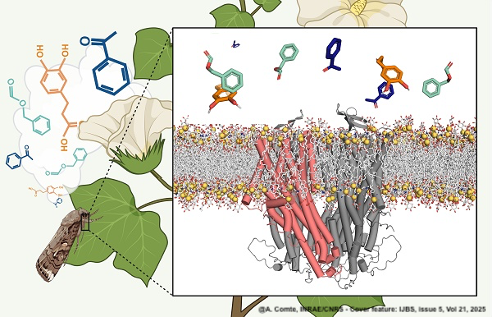June 2025, 27 scientific talks
Published on 01 June 2025
CSGA welcomes Emmanuelle Jacquin-Joly, Camille Meslin and Nicolas Montagné from the Institut d'Écologie et des Sciences de l'Environnement (iEES) in Paris, for a joint seminar, starting at 11am in the conference room.
Starting at 10:30 a.m., the speakers and staff will meet for tea/coffee and pastries.

Background
The team's research focuses on the mechanisms of chemical communication in insects, in an agro-ecological context.
Using a multidisciplinary approach, the objectives are to
1) understand the molecular mechanisms of chemical detection in insects, with a focus on chemosensory receptors,
2) understand the evolution of these receptors and their contribution to insect adaptation to new environments and anthropogenic pressures, with the ultimate aim of
3) using them as targets in a reverse chemical ecology approach for the development of biocontrol strategies.
Summary of Emmanuelle Jacquin-Joly's speech
Reverse chemical ecology targeting insect olfactory receptors: new perspectives in biocontrol
Insect olfactory receptors detect odors and control insect behavior.
Disrupting these receptors offers a promising avenue for controlling insect pests.
Thanks to methods combining modeling and experimentation, new compounds targeting these receptors have been identified, for example for a crop-destroying moth, the cotton moth.
References
Caballerro-Vidal et al. (2021) CMLS https://dx.doi.org/10.1007/s00018-021-03919-22
Comte et al. (2025) IJBS https://www.ijbs.com/v21p2101.htm
Summary of Camille Meslin's speech
Deciphering the evolution of olfactory and gustatory receptors in crop pests
Olfaction and gustation influence reproductive behavior and host plant selection in insects.
By combining evolutionary analyses, modeling and experimentation, the divergent evolution of the OR5 and OR75 olfactory receptors was revealed.
As a preliminary result, a single- cell-nucleus RNA sequencing approach used to identify taste receptor combinations will be presented.
References
Li et al. (2023) PNAS https://doi.org/10.1073/pnas.2221166120
Summary of Nicolas Montagné's speech
Evolution of chemical senses in aquatic insects
Nicolas investigates the adaptation of the olfactory and gustatory senses in aquatic beetles such as dytids, pond insects and predators of mosquito larvae.
By analyzing their anatomy, chemosensory genes and chemical communication, he aims to understand how these insects interact underwater.

